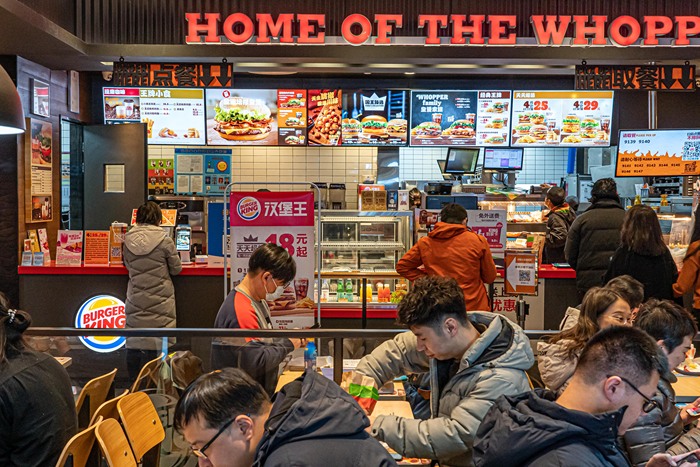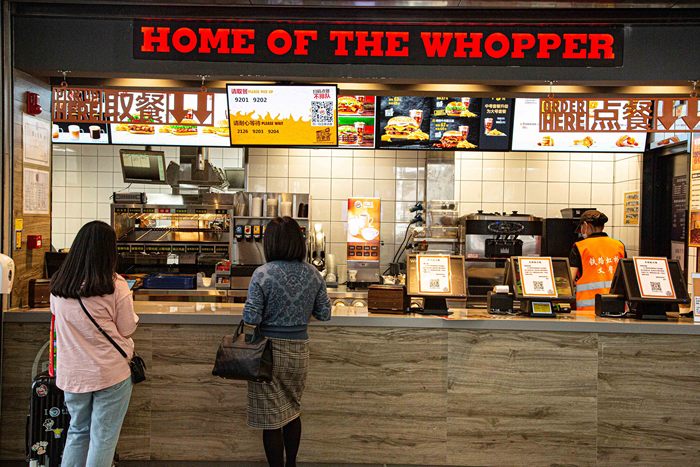Industry giants are rapidly expanding towards the 10,000-store milestone, while Burger King lags in both store count and market penetration.

Photo by Fan Jianlei
by Li Ye
Burger King's parent company, Restaurant Brands International (RBI), has reclaimed its China franchise rights from Turkish conglomerate TAB Foods Investments (TFI) as it seeks a fresh local partner to revitalize the struggling fast-food chain in the mainland market.
In a statement on February 18, RBI confirmed the acquisition of nearly all shares in Burger King China for US$158 million (about 1.15 billion yuan). The decision follows prolonged discussions after RBI executives signaled in the third quarter of 2023 that they intended to terminate their partnership with TFI.
The move comes amid stagnating growth and operational setbacks that have seen Burger King China fall behind its Western fast-food rivals. Since 2023, the brand has repeatedly missed expansion targets and even reduced its total store count due to increasing competitive pressures. Market perception of Burger King has also weakened, raising concerns over its long-term prospects.
Despite the challenges, RBI remains committed to the China market, describing the current difficulties as "temporary pressures." However, finding the right local operator to drive the brand’s turnaround is now an urgent priority. When approached for further details on the search for a new franchise partner, RBI's China representatives declined to comment.

Compared with McDonald’s and KFC, Burger King has struggled to scale its presence in China. Industry giants are rapidly expanding towards the 10,000-store milestone, while Burger King lags in both store count and market penetration. Key competitive factors such as pricing, marketing, localization, and expansion into lower-tier cities have also proven challenging for the brand.
To regain momentum, Burger King needs an operator with a deep understanding of China’s fast-food landscape and the ability to execute an international brand strategy locally. Potential candidates include Jollibee Foods Corporation and Ting Hsin International Group.
Jollibee, while not a household name in China, has established a significant presence through acquisitions of local brands such as Yonghe King, Hong Zhuang Yuan, and Tim Ho Wan. With 567 outlets across China as of 2023, the group lacks a flagship Western fast-food brand to enhance its portfolio. Meanwhile, Ting Hsin operates Dicos, a fried chicken chain with over 3,000 outlets, and could leverage its existing supply chains and experience to expand Burger King's footprint, particularly in lower-tier markets.
Burger King’s struggles stem partly from its failure to penetrate China’s smaller cities, where rivals have made major inroads. Data from analytics firm Jihai shows that more than 60% of Burger King outlets are concentrated in top-tier cities, with only about 10% located in lower-tier markets. Expanding into these areas could be key to reversing its sluggish growth.
“In prime locations, property developers tend to avoid placing competing brands too close together,” said Long Zhen, a franchise evaluation expert and founder of Jiameng Data. “Since McDonald’s and KFC already dominate key commercial areas, it has become increasingly difficult for Burger King to secure strong locations.”
Ting Hsin’s Dicos has adopted a "rural-to-urban" strategy, with over 60% of its stores in lower-tier cities. If Burger King follows a similar model, it could accelerate its expansion and resolve its sluggish growth issue.

While potential partners like Jollibee and Ting Hsin offer scale and operational expertise, both have struggled with brand visibility in China. Unlike McDonald’s and KFC, which heavily invest in marketing, collaborations, and promotions, Burger King has remained relatively low-profile. Even its budget-friendly promotions, such as its "9.9 yuan" meal deal, have failed to gain traction due to limited store presence and weak marketing efforts.
Some industry observers suggest that a mid-sized Chinese restaurant group, rather than a multinational, could be better suited to manage Burger King China. The franchise transition of Subway to Shanghai Fu Ruishi, a relatively unknown but well-connected Chinese company, serves as an example.
Shanghai Fu Ruishi acquired the exclusive rights to develop Subway in mainland China in mid-2023, with an ambitious plan to open nearly 4,000 new outlets over 20 years. Despite limited prior visibility in the restaurant sector, its leadership team includes experienced executives from McDonald’s and Burger King China, and it has already implemented significant operational changes, including shifting to a direct ownership model and localizing the menu.
Many of the challenges Subway faced—site selection, franchisee relations, and declining brand awareness—mirror those of Burger King. Some of Subway China’s key executives were recruited from Burger King China, further underscoring the overlap in industry expertise.
Burger King has long been a recognizable name in China’s fast-food market, particularly for its flame-grilled beef burgers. However, in an industry increasingly dominated by well-funded and aggressively expanding competitors, it risks being overshadowed. The path forward will depend on its ability to secure a strong local partner that can improve operational efficiency, enhance marketing efforts, and execute a successful expansion strategy in lower-tier markets.
With the right leadership, Burger King China may still have a chance to reclaim its place in the country’s competitive fast-food landscape.